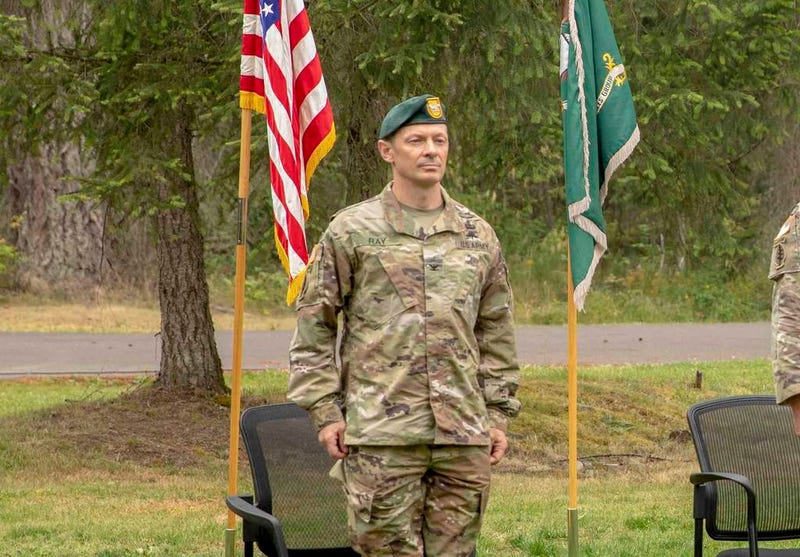
A superior court in Washington is set to decide this week if Deputy Prosecuting Attorney (DPA) Coreen Schnepf will be disqualified and removed from the domestic violence trial of Special Forces Col. Owen Ray.
Ray allegedly held his family hostage at gunpoint during an alcohol-fueled stand-off with police, leading to domestic violence charges. Formerly the commander of 1st Special Forces Group, Ray was serving as the Chief of Staff to Lt. Gen. George at Joint Base-Lewis McCord (JBLM) at the time of the incident. Because it happened off post, the case is being tried by civilian courts.

Ray's lawyer Jared Ausserer has sought to have DPA Schnepf removed on the basis of his research into her personal life, discovering that she is a domestic violence survivor herself, according to court documents. He then submitted to the court that Schnepf had made inaccurate statements to the court regarding Ray's mental health treatment and pretrial confinement parameters and that she likely demonstrated a bias.
The court itself does not make judgments on potential violations of the rules of professional conduct, which would require its own hearing, but can weigh in on conflicts of interest that may disqualify a prosecutor. At a hearing in February, Ausserer called his client to the stand to testify that what the Army was saying was, "...entirely at odds with the State's representations at that hearing."
Meanwhile, the DPA argued that her past statements to the court were consistent and accurate with what the Army had told her at the time about Ray's disposition, court documents state. Judge Rumbaugh then ordered the prosecutor and defense to depose Col. Christopher A. Kennebeck, the JAG officer who had been in communication with Schnepf.
In the deposition, Col. Kennebeck stated that DPA Schnepf's statements were, "absolutely" consistent with what he had told her at the time of Ray's previous hearing. The deposition also revealed interesting details about special treatment that Ray received from his chain of command.
When the bond was reduced from $1 million to $100,000, the Army was caught by surprise that Ray would now be released into Army custody. They scrambled to figure out what to do with him. Col. Kennebeck pointed out that commanders are fairly limited in what they can do to confine soldiers, relying merely on giving them orders to remain in place or pretrial confinement but that can only be done pending a court-martial, and it seemed almost certain that Ray's case would be handled in civilian courts.
Meanwhile, Mrs. Ray was terrified that her husband would return home and attack the family again. JBLM headquarters was only 3 miles away from his wife's home and the Army estimated Ray could run there in about 18 minutes. As far as sticking Ray in the barracks, Col. Kennebeck stated, "we don't put senior officers in the -- I mean, barracks, generally, are meant for enlisted soldiers."
In a similar situation, an enlisted soldier would be confined in the barracks, made to be in uniform and wearing a reflective road guard vest while being escorted around by two uniformed soldiers. Ray was ultimately put in a hotel room for a night with CID agents on guard across the hall before he was sent for inpatient treatment at a civilian behavior health clinic, court documents describe. He was given escorts wearing civilian clothes.
Col. Kennebeck described the circumstances in the deposition saying, "Let's say we have a sergeant who had fist-to-cuffs domestic violence with a spouse. Those COAs [Courses Of Action] that we're talking about there could be developed in an hour and executed within an hour from command."
"In this case, I think with the colonel, with the severity of the alleged incident, and with the public scrutiny, the high media potential, I think all of those were factors that, you know, I think caused a great deal of staff work," Kennebeck continued. "So I would say it was harder to get the COAs developed and approved in this case."
However, even with armed CID agents outside the room, Kennebeck admitted that Ray could have gone out a window if he really wanted to. "I mean, if he wanted to go do something bad, you can't stop him, even the armed guards. All he'd need to do is wait for an opportunity to escape, run. They would never find him, and he could be at his house in 18 minutes," the JAG said.
While the judge is set to make a final judgment about whether the prosecutor will remain on the case, Special Forces Command appears to be fed up with Col. Ray and had made moves to strip him of his Special Forces tab. Ray was not assigned to a Special Forces unit during the incident and so he was not their soldier to take any action on, but taking away his tab sends a symbolic message to the force that his behavior is unacceptable.
Want to get more connected to the stories and resources Connecting Vets has to offer? Click here to sign up for our weekly newsletter.
Reach Jack Murphy: jack@connectingvets.com or @JackMurphyRGR.


